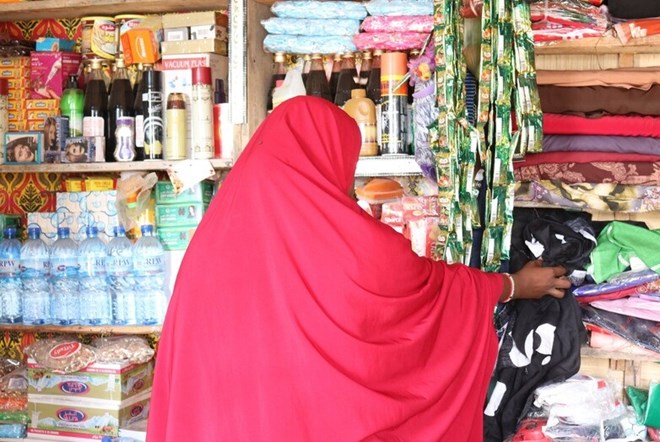
Sunday August 18, 2024

A shopper in Kismayo, Jubaland, browses through goods in a local store. The introduction of Somalia's new 5% sales tax is expected to impact consumer prices across the country. (Photo Credit: GIZ)
Kismayo (HOL) — Jubbaland's Ministry of Finance has firmly rejected the Somali Federal Government's decision to impose a 5% sales tax on businesses.
The tax, scheduled to take effect on August 18, 2024, will be automatically deducted from business accounts at the point of sale, a move that Jubbaland officials claim was made without their consultation or consent.
In a statement, Jubbaland's Ministry of Finance advised local businesses to disregard the federal mandate and continue operating under the region's tax laws, which were established in 2023.
The backlash against the tax has not been limited to Jubbaland. In Mogadishu, the new policy has sparked many protests, particularly among Bajaj (tuk-tuk) drivers, who argue that the tax is an undue burden on their strained livelihoods. The protesters publicly voiced their discontent with the economic policies of the federal government.
In response to these developments, a group of Somali MPs submitted a formal request to the Speaker of Parliament, urging the inclusion of discussions about the public grievances surrounding the tax in the parliamentary agenda. The MPs, citing Article 25, Paragraph 3, Section "d" of the parliamentary bylaws, stressed the need for an urgent debate to address the concerns of businesses and citizens.
There are concerns that the automatic sales tax deduction could place significant financial strain on businesses, particularly those without access to formal banking services. Experts suggest that such financial pressures could lead to higher prices for goods and services, potentially prompting consumers to seek untaxed goods in the informal market or reduce their overall spending. Additionally, there is a risk that the tax could be met with more resistance in regions where residents feel they do not receive adequate government services, complicating enforcement efforts.